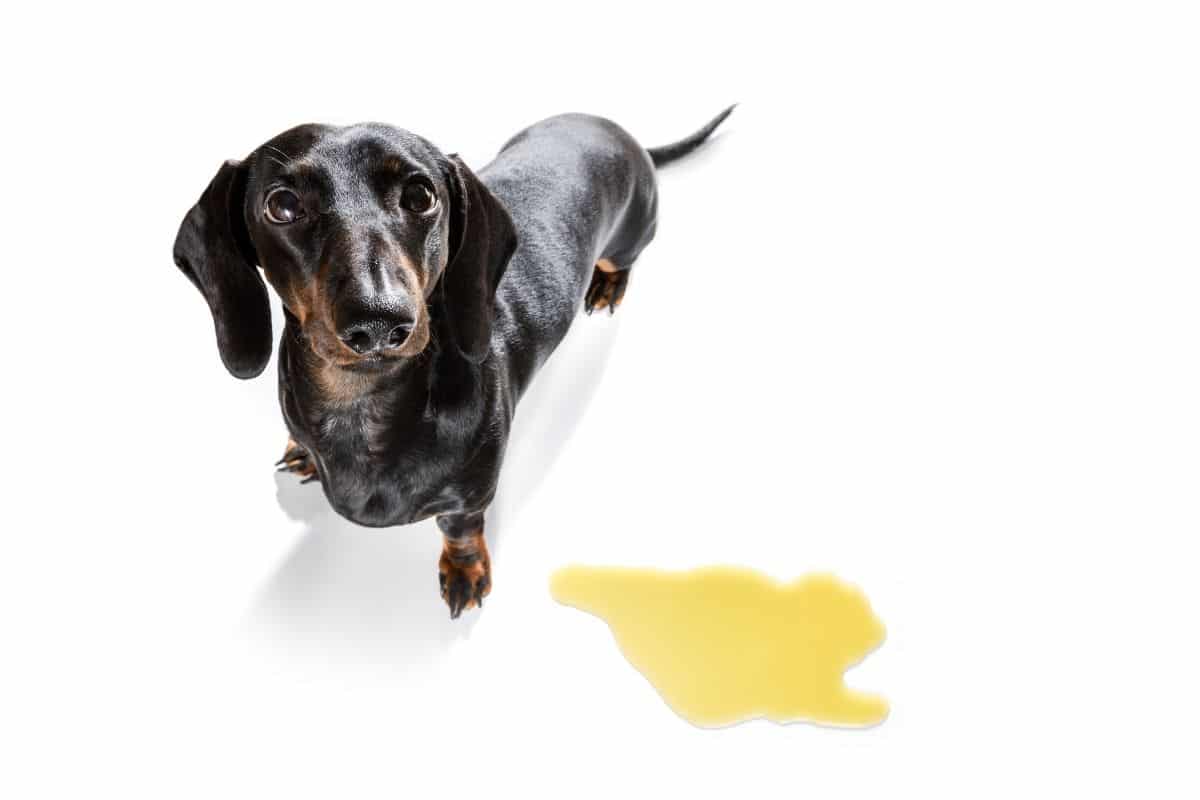Realizing that your dog’s pee smells strong is not something that happens every day, but you should be thankful that you caught a whiff of it because it could be one of the first signs that something is going on with your dog that might call for medical treatment.

All the possible reasons as to why your dog’s pee smells so bad will be covered as well as some different smells and what they could mean.
Causes Of Strong-Smelling Urine In Dogs
Ranging in severity, here is a list of some reasons why your dog’s pee smells so bad.
Dehydration
It’s not too uncommon for dogs to get dehydrated from time to time, either because it’s been a hot day or they haven’t had a lot of opportunities to drink water.
Being dehydrated causes the urine to have a strong smell of ammonia due to the higher concentration of waste in the urine. If dehydration is the culprit, the urine will also be darker.
Other signs of dehydration in dogs are sunken eyes that are also a bit dull, an increased heart rate, unsteadiness, lethargy, and pale gums.
Treating dehydration depends on how serious it is. If your dog is mildly dehydrated, you should try giving them more frequent offerings of water.
You can try adding some electrolyte powder to their water to give them some extra hydration but make sure that it is a brand that is specially made for dogs and puppies.
If your dog is vomiting and not able to hold any water down, then you can try giving them some ice chips in small amounts and take them to the vet.
A severely dehydrated dog must be taken to the vet so that they can put a drip in to get them hydrated again in a more direct, quicker way.
Diet
Sometimes, the combination of food in your dog’s diet will make their urine smell stronger than usual. It can also be due to their diet being suddenly changed. The introduction of foods such as fish and asparagus will make their urine smell strong as well.
Urinary Tract Infection (UTI)
Urinary tract infections are caused when bacteria get into the opening of the urethra. Both female and male dogs can get them, but they are mostly seen in females as their urethra is shorter and wider, making it easier for bacteria to enter.
You may see your dog peeing more frequently and straining as they do so. In some cases, there will be a bit of blood evident in the urine as well.
Drinking more water than usual, grooming their private parts, and dribbling urine are also common signs that they are suffering from a UTI.
If they are caught early enough, UTIs are not serious and a course of antibiotics from the vet should clear it up within a week or two.
If it is not caught in time, the outcome is similar to humans as the infection can spread to the kidneys and then to the bloodstream, possibly resulting in sepsis.
Kidney Disease
Kidney disease is another health condition that can make your dog’s urine smell strong because you can smell the waste in the urine being more concentrated as the kidneys are not working correctly.
It could either be kidney disease or kidney failure which are both serious but can be caused by different things so if you see any of the following symptoms, you need to book an appointment with your vet as soon as possible.
Urinating more frequently is one of the symptoms of kidney failure which will then make your dog drink more to make up for the lost fluids.
A build-up of toxins in the body will likely cause your dog to feel nausea and vomit or will make them retch with a loss of appetite.
You might also notice other symptoms in your dog such as lethargy, weight loss, pale gums, fragile bones, and mouth ulcers.
Different Urine Smells
You may not want to admit it, but sometimes the smell of your dog’s pee is unavoidable (especially if they have had an accident inside), having the ability to pick up on certain scents within it can be a great way to figure out what is going on with them.
Fishy
If you are picking up on a fishy smell in your dog’s urine, it is likely because they are experiencing urinary problems that were covered earlier such as a urinary tract infection, but it can also point toward kidney or bladder stones.
You must contact your vet as soon as possible because it is very likely that your dog is in a lot of pain and discomfort.
Sweet
Your dog’s pee is smelling sweet because you can smell the glucose in it which means that there is too much of it in your dog’s blood. This should be taken as a warning sign toward diabetes and taking your dog to the vet for a urine test is the next thing that you should do.
It Might Not Be the Urine That’s Smelling

Sometimes, owners get it mixed up and believe that it is the pee that they can smell, but it is actually coming from another part of their dog. Dogs can be very smelly creatures and no matter how many baths we give them, they still find a way to stink up the room when they walk in.
Unfortunately, there are some possible underlying conditions that your dog is fighting with that might be the cause of them being smelly such as skin infections, pyometra, blocked anal glands, and vaginitis which are usually most pungent around the dog’s private area which is why owners can think that the smell is coming from the urine.
Skin Infection
Skin infections can be caused by a variety of things and this can influence how they smell as well. Symptoms of a skin infection included itchiness and hair loss either due to the infection destroying the hair follicles, or the dog being so itchy that they lick or scratch themselves bald.
You will also see that your dog will show that they are feeling uncomfortable and sensitive especially when you touch the affected areas.
Since skin infections are either bacterial or fungal, they are paired with a foul smell that ranges in strength depending on the severity of the infection.
Pyometra
This is when the womb or uterus has a very serious infection which causes it to fill up with pus weighing as much as 2 kg. If pyometra is left untreated, it can lead to consequences such as kidney failure, dehydration, toxemia, and even death.
Since it is such a serious condition, the only way for it to be treated is to have the whole womb or uterus removed in emergency surgery.
It is caused by a bacterial infection such as E. coli that happens around two weeks after a female dog has completed her season.
The risk of infection is higher when the dog is going through a season because they go through a lot of hormonal changes which makes them more susceptible.
The early signs of pyometra is your dog losing their appetite, becoming lethargic, thirsty, and in some cases will have discharge coming from their vagina.
If the condition is left, the dog might begin to vomit and refuse to move. Picking up on the signs of pyometra early on is vital for the survival of your dog, so it is good practice to keep an eye on them after their season.
Blocked Anal Glands
This is likely one of the least glamorous parts of owning a dog and a lot of people know all too well that distinct, fishy smell that comes from our dog’s bum when they have blocked anal glands.
Some breeds are more likely to get blocked anal glands and the owner has to express them at home, but it can happen to any dog.
They are not life-threatening by any means but can get uncomfortable for your dog which is why you will see them drag themselves along your carpet or bite their bum.
Anal glands are positioned on either side of a dog’s anus that fill up with an oily, fishy substance and therefore can get blocked if your dog is not passing poos that are firm enough.
Anal glands have a purpose though which is to help the poo pass more smoothly and disperse the dog’s scent as a way to mark things.
It is also said that dogs have anal glands because it stores pheromones that other dogs smell to get information from one another.
You can either take your dog to the vet to get their glands expressed or research on how to do it at home.
Make sure that you are gentle with your dog and if they seem stressed or in pain, take them to a vet for them to do it instead. You shouldn’t express their glands too often though as this can make them inflamed and irritated.
Vaginitis
Vaginitis is when the vagina is inflamed and can happen to female dogs who are both spayed or unspayed and at any age. There are a lot of things that can cause this condition such as a UTI, vaginal tumor, vaginal trauma, infection, foreign bodies, and more.
You might see vaginal discharge or mucus and your dog might lick themselves a lot more than usual and urinate frequently. Your vet will likely prescribe a course of antibiotics for your dog but if it is a more serious case, your dog might require surgery.
Summary
To summarize, dog pee doesn’t usually have a smell that most people would describe as pleasant but when it smells especially bad, that is when alarm bells should go off in your head.
If your dog’s urine smells bad only once or twice then it is typically because they were a bit dehydrated that day and the only thing you need to worry about is keeping their water bowl topped up with fresh water.
However, if the urine has been smelling strong and foul consistently for a few days or weeks even, then the best thing to do is take them to the vet for a thorough check-up because it could even save their lives.
- What Dog Breeds Have Pink Skin? - March 24, 2023
- What Are the Most Inspiring Dog Breeding Quotes? - March 20, 2023
- Can Pheromone Spray Help Improve Dog Breeding Results? - March 19, 2023








